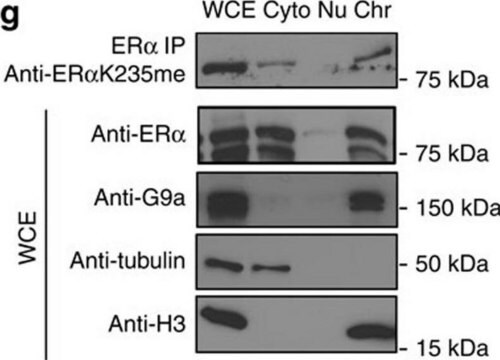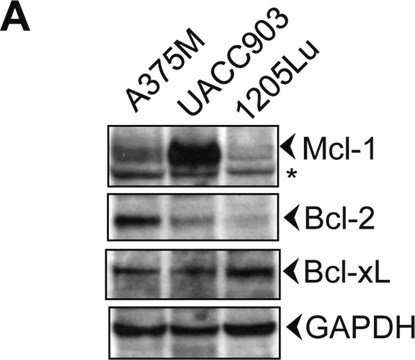R0655
Anti-Ribosomal Protein L26 (N-terminal) antibody produced in rabbit
~1 mg/mL, affinity isolated antibody, buffered aqueous solution
Sinónimos:
Anti-RPL26
About This Item
Productos recomendados
biological source
rabbit
conjugate
unconjugated
antibody form
affinity isolated antibody
antibody product type
primary antibodies
clone
polyclonal
form
buffered aqueous solution
mol wt
antigen 17 kDa
species reactivity
mouse, human, rat
concentration
~1 mg/mL
technique(s)
immunoprecipitation (IP): 5-10 μg using HEK-293T cell lysates
indirect immunofluorescence: 5-10 μg/mL using paraformaldehye-fixed HeLa cells
western blot: 0.5-1 μg/mL using HEK-293T cell extracts
UniProt accession no.
shipped in
dry ice
storage temp.
−20°C
target post-translational modification
unmodified
Gene Information
human ... RPL26(6154)
mouse ... Rpl26(19941)
rat ... Rpl26(287417)
General description
Specificity
Immunogen
Application
- immunoblotting
- immunoprecipitation
- immunostaining
- immunofluorescence
- coimmunoprecipitation analysis
Biochem/physiol Actions
Physical form
Disclaimer
¿No encuentra el producto adecuado?
Pruebe nuestro Herramienta de selección de productos.
related product
Storage Class
10 - Combustible liquids
wgk_germany
WGK 3
flash_point_f
Not applicable
flash_point_c
Not applicable
ppe
Eyeshields, Gloves, multi-purpose combination respirator cartridge (US)
Certificados de análisis (COA)
Busque Certificados de análisis (COA) introduciendo el número de lote del producto. Los números de lote se encuentran en la etiqueta del producto después de las palabras «Lot» o «Batch»
¿Ya tiene este producto?
Encuentre la documentación para los productos que ha comprado recientemente en la Biblioteca de documentos.
Nuestro equipo de científicos tiene experiencia en todas las áreas de investigación: Ciencias de la vida, Ciencia de los materiales, Síntesis química, Cromatografía, Analítica y muchas otras.
Póngase en contacto con el Servicio técnico






